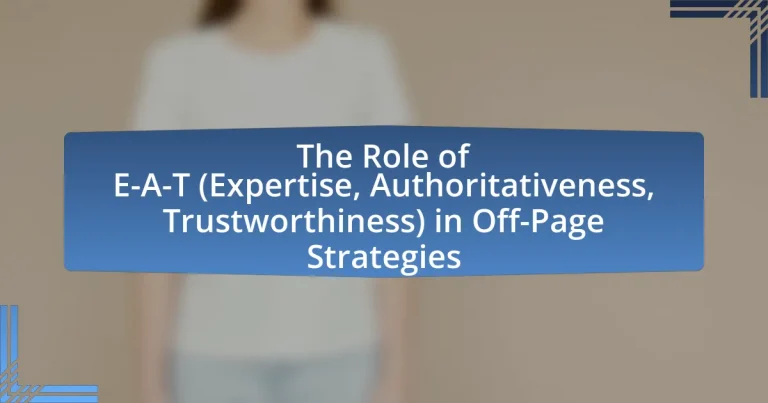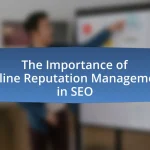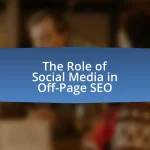E-A-T, which stands for Expertise, Authoritativeness, and Trustworthiness, is a critical framework used by search engines to assess the quality of content and the credibility of its creators. This article explores the significance of E-A-T in off-page strategies, detailing how each component interacts to enhance content credibility and influence search engine rankings. It discusses the role of expertise in establishing trust, the importance of authoritativeness in enhancing credibility, and the necessity of trustworthiness for user engagement. Additionally, the article outlines effective off-page strategies, such as acquiring high-quality backlinks and engaging in content marketing, to improve E-A-T and drive better business outcomes.
-1.webp)
What is E-A-T (Expertise, Authoritativeness, Trustworthiness)?
E-A-T stands for Expertise, Authoritativeness, and Trustworthiness, which are key factors used by search engines to evaluate the quality of content and the credibility of its creators. Expertise refers to the knowledge and skill of the content creator in a specific field, Authoritativeness indicates the recognition and reputation of the creator or the website as a reliable source, and Trustworthiness reflects the reliability and integrity of the content and its source. These elements are crucial for improving search engine rankings and ensuring that users receive accurate and reliable information.
How do the components of E-A-T interact with each other?
The components of E-A-T—Expertise, Authoritativeness, and Trustworthiness—interact synergistically to enhance the credibility of content. Expertise establishes the knowledge and skill level of the content creator, which is essential for providing accurate and valuable information. Authoritativeness builds on this by positioning the creator or the content as a recognized source within a specific field, often supported by citations, references, or endorsements from other authoritative figures. Trustworthiness is the final component that ensures users feel safe and confident in the information provided, often influenced by user reviews, secure website practices, and transparency in content creation. Together, these components create a holistic framework where expertise lends credibility, authoritativeness amplifies that credibility, and trustworthiness solidifies user confidence, ultimately improving the overall perception and effectiveness of off-page strategies.
What role does expertise play in establishing E-A-T?
Expertise is a critical component in establishing E-A-T, as it directly influences the perceived quality and reliability of content. When content is created by individuals with recognized knowledge or qualifications in a specific field, it enhances the credibility of the information presented. For instance, medical articles authored by licensed healthcare professionals are viewed as more trustworthy compared to those written by non-experts. This is supported by Google’s Search Quality Evaluator Guidelines, which emphasize that expertise is essential for content that requires a high level of accuracy, particularly in areas like health, finance, and legal matters. Thus, expertise not only bolsters the authority of the content but also fosters user trust, which is fundamental for effective off-page strategies.
How does authoritativeness contribute to E-A-T?
Authoritativeness significantly enhances E-A-T by establishing credibility and trust in the content provided. When a source is recognized as authoritative, it indicates that the information is reliable and backed by expertise, which is essential for users seeking accurate knowledge. For instance, websites that are cited by reputable institutions or have high domain authority are often viewed as more trustworthy, thereby improving their E-A-T score. This is supported by Google’s Search Quality Evaluator Guidelines, which emphasize the importance of authoritativeness in determining the quality of content and its ranking in search results.
Why is trustworthiness essential for E-A-T?
Trustworthiness is essential for E-A-T because it establishes credibility and reliability, which are crucial for users and search engines when evaluating content. A trustworthy source is more likely to be perceived as authoritative and expert, leading to higher rankings in search results. Research by Google emphasizes that trustworthiness directly influences user engagement and satisfaction, as users prefer content from sources they can trust. This is supported by the fact that websites with high trust signals, such as secure connections and positive user reviews, tend to perform better in search engine rankings.
What is the significance of E-A-T in digital marketing?
E-A-T, which stands for Expertise, Authoritativeness, and Trustworthiness, is significant in digital marketing as it directly influences search engine rankings and user trust. Search engines like Google prioritize content that demonstrates high levels of E-A-T, as this correlates with delivering valuable and reliable information to users. For instance, a study by Moz indicated that E-A-T factors are critical in determining the quality of content, impacting how websites rank in search results. Websites that effectively showcase their expertise, establish authority in their niche, and build trust with their audience are more likely to achieve higher visibility and engagement, ultimately driving better business outcomes.
How does E-A-T influence search engine rankings?
E-A-T, which stands for Expertise, Authoritativeness, and Trustworthiness, significantly influences search engine rankings by serving as a key criterion for evaluating the quality of content and its creators. Search engines, particularly Google, prioritize content that demonstrates high levels of E-A-T, as it correlates with user satisfaction and reliable information. For instance, websites that provide expert insights, are recognized as authoritative sources in their field, and maintain a trustworthy reputation are more likely to rank higher in search results. This is supported by Google’s Search Quality Evaluator Guidelines, which emphasize that content creators should exhibit expertise in their subject matter, thereby enhancing the perceived value of the content and improving its visibility in search rankings.
What impact does E-A-T have on user engagement?
E-A-T significantly enhances user engagement by establishing credibility and trust with the audience. When content demonstrates expertise, authoritativeness, and trustworthiness, users are more likely to interact with it, share it, and return for more. Research indicates that websites with high E-A-T scores experience lower bounce rates and higher time-on-page metrics, which are indicators of user engagement. For instance, a study by Moz found that sites perceived as authoritative receive 50% more organic traffic than those that do not meet E-A-T standards, directly correlating E-A-T with increased user interaction.
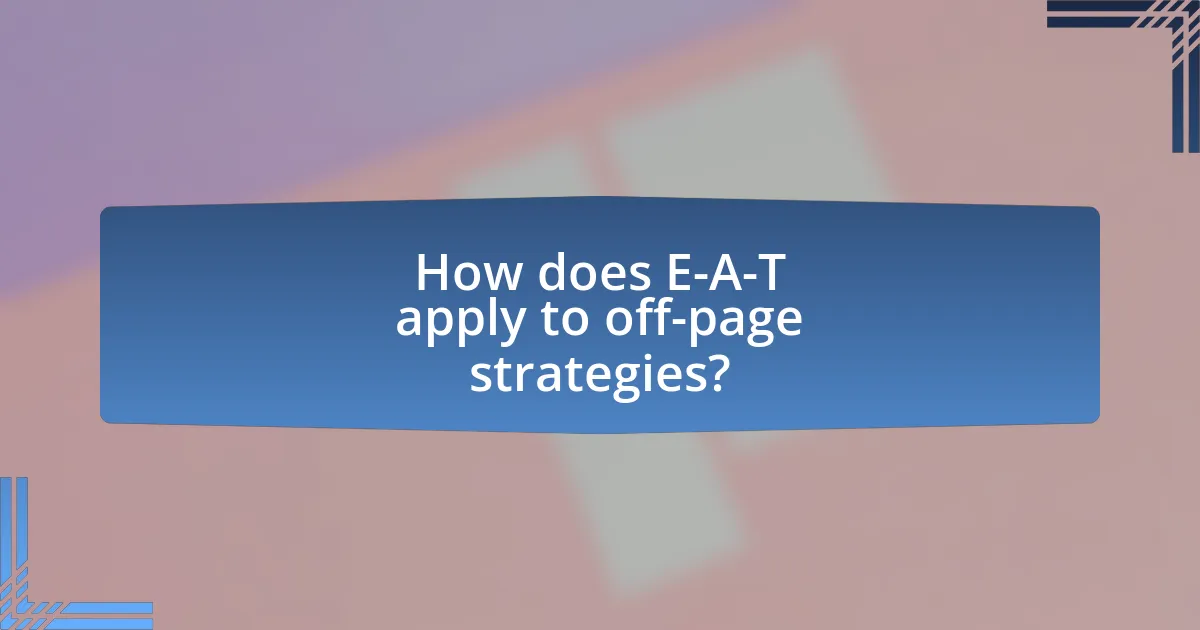
How does E-A-T apply to off-page strategies?
E-A-T, which stands for Expertise, Authoritativeness, and Trustworthiness, applies to off-page strategies by influencing how external signals, such as backlinks and social media mentions, are perceived in terms of credibility. Off-page strategies that prioritize acquiring backlinks from reputable sources enhance a website’s perceived expertise and authority, as search engines recognize these links as endorsements from other credible entities. For instance, a study by Moz indicates that high-quality backlinks significantly impact search rankings, reinforcing the importance of E-A-T in off-page SEO. Additionally, social proof through positive reviews and mentions on authoritative platforms contributes to a brand’s trustworthiness, further solidifying its E-A-T profile in the eyes of both users and search engines.
What are the key off-page strategies that leverage E-A-T?
Key off-page strategies that leverage E-A-T include building high-quality backlinks, engaging in influencer partnerships, and creating authoritative content on reputable platforms. High-quality backlinks from authoritative sites signal expertise and trustworthiness, enhancing a website’s credibility. Influencer partnerships can amplify reach and establish authority through association with recognized figures in a niche. Additionally, publishing content on reputable platforms, such as guest blogging on established websites, reinforces expertise and builds trust with audiences. These strategies collectively enhance a site’s E-A-T, positively impacting search engine rankings and user perception.
How can backlinks enhance E-A-T?
Backlinks enhance E-A-T by signaling to search engines that a website is credible and authoritative. When reputable sites link to a webpage, it indicates that the content is valuable and trustworthy, which boosts the perceived expertise of the linked site. For instance, a study by Moz found that backlinks from high-authority domains significantly improve a site’s ranking potential, reinforcing its authoritativeness. Additionally, Google’s Search Quality Evaluator Guidelines emphasize that links from authoritative sources contribute to a site’s overall trustworthiness, further solidifying the connection between backlinks and E-A-T.
What role do social signals play in establishing E-A-T?
Social signals play a significant role in establishing E-A-T by indicating the level of engagement and credibility a website or content has within its community. High levels of social interaction, such as shares, likes, and comments, suggest that the content is valuable and trusted by users, which enhances its perceived expertise and authoritativeness. Research shows that content with strong social signals tends to rank higher in search engine results, as search algorithms often consider these signals as indicators of quality and relevance. Therefore, social signals contribute to building trustworthiness, as they reflect user approval and endorsement of the content.
How can content marketing improve E-A-T in off-page strategies?
Content marketing can enhance E-A-T in off-page strategies by creating high-quality, informative content that establishes expertise and builds authority. When brands produce valuable content, they attract backlinks from reputable sources, which signals trustworthiness to search engines. For instance, a study by Moz indicates that websites with higher-quality content receive more backlinks, which directly correlates with improved search rankings. Additionally, content that addresses user needs fosters engagement and encourages social sharing, further amplifying a brand’s authority and trust within its niche.
What types of content are most effective for showcasing expertise?
The most effective types of content for showcasing expertise include in-depth articles, case studies, white papers, and video tutorials. In-depth articles provide comprehensive insights into specific topics, demonstrating a deep understanding and knowledge base. Case studies illustrate real-world applications of expertise, showcasing problem-solving skills and successful outcomes. White papers present research findings or detailed analyses, establishing authority in a particular field. Video tutorials offer visual and practical demonstrations of skills, enhancing engagement and credibility. These content types are supported by the fact that they not only inform but also build trust with the audience, aligning with the principles of E-A-T (Expertise, Authoritativeness, Trustworthiness) essential for effective off-page strategies.
How can guest blogging enhance authoritativeness?
Guest blogging enhances authoritativeness by allowing authors to showcase their expertise on reputable platforms, thereby increasing their credibility. When an author contributes high-quality content to established websites, they gain visibility among a wider audience and are often associated with the authority of the host site. This association can lead to improved perceptions of the author’s knowledge and reliability in their field. Research indicates that backlinks from authoritative sites can significantly boost a website’s domain authority, which is a key factor in search engine rankings, further solidifying the author’s position as an expert.
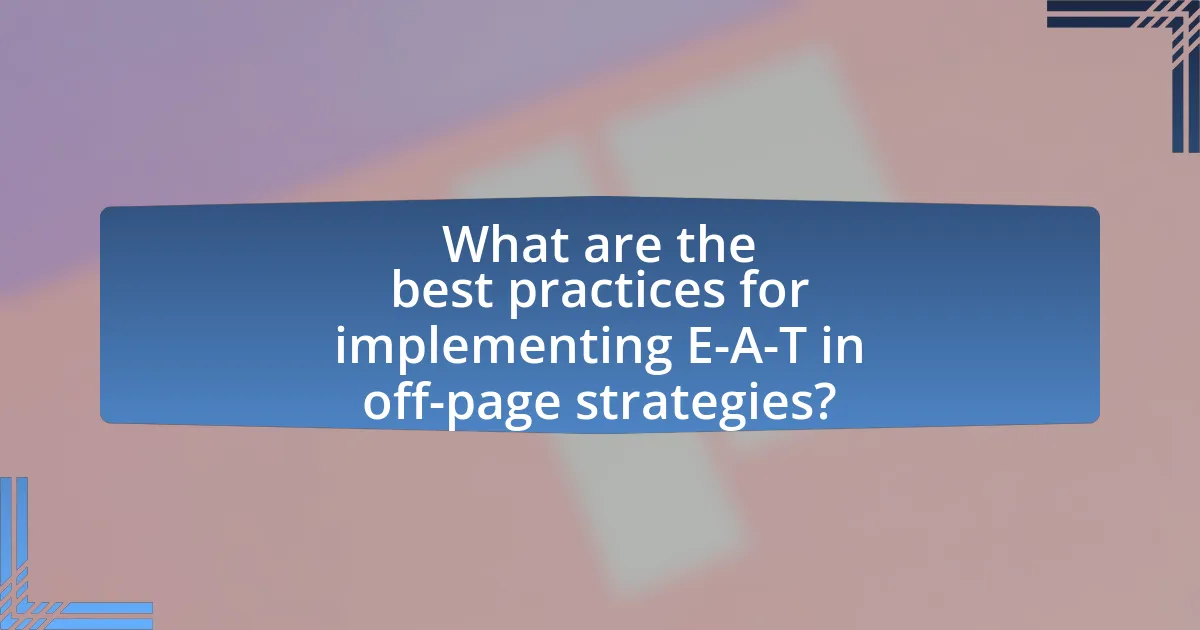
What are the best practices for implementing E-A-T in off-page strategies?
The best practices for implementing E-A-T in off-page strategies include acquiring high-quality backlinks from authoritative websites, engaging in guest blogging on reputable platforms, and actively participating in industry-related forums and discussions. High-quality backlinks signal to search engines that a site is credible and trustworthy, as evidenced by a study from Moz which found that backlinks from authoritative domains significantly improve search rankings. Guest blogging on reputable sites not only enhances visibility but also establishes expertise in the field, while participation in forums fosters community trust and authority. These practices collectively enhance a website’s perceived expertise, authoritativeness, and trustworthiness, aligning with Google’s E-A-T guidelines.
How can businesses build trustworthiness through off-page efforts?
Businesses can build trustworthiness through off-page efforts by engaging in high-quality backlink strategies, fostering positive online reviews, and participating in relevant industry discussions. High-quality backlinks from reputable sources signal to search engines and users that a business is credible and authoritative. For instance, a study by Moz indicates that backlinks from authoritative domains significantly enhance a site’s trustworthiness. Additionally, positive online reviews on platforms like Google and Yelp contribute to a business’s reputation, as 84% of consumers trust online reviews as much as personal recommendations, according to BrightLocal. Furthermore, active participation in industry forums and social media discussions helps establish a business as a knowledgeable leader in its field, reinforcing its trustworthiness among potential customers.
What are effective ways to gain high-quality backlinks?
Effective ways to gain high-quality backlinks include creating valuable content, engaging in guest blogging, and leveraging relationships with influencers. Valuable content, such as in-depth articles, infographics, or original research, attracts links naturally as others reference it. Guest blogging on reputable sites allows for exposure and the opportunity to include backlinks to your own site. Building relationships with influencers can lead to mentions and links from their platforms, enhancing your site’s authority. According to a study by Ahrefs, 91% of content never gets any organic traffic, highlighting the importance of quality content in attracting backlinks.
How can online reviews and testimonials enhance trustworthiness?
Online reviews and testimonials enhance trustworthiness by providing social proof that influences consumer perceptions. When potential customers see positive feedback from previous buyers, it validates the quality and reliability of a product or service. Research indicates that 79% of consumers trust online reviews as much as personal recommendations, highlighting their significant impact on purchasing decisions. Furthermore, platforms like Yelp and Google My Business aggregate user-generated content, which fosters transparency and accountability, further reinforcing trust in brands.
What common mistakes should be avoided when focusing on E-A-T?
Common mistakes to avoid when focusing on E-A-T include neglecting to showcase genuine expertise, failing to provide credible author information, and not maintaining transparency with users. Neglecting to highlight qualifications or experience can undermine perceived expertise, while omitting author bios or credentials can diminish authoritativeness. Additionally, a lack of transparency, such as not disclosing conflicts of interest or sources, can erode trustworthiness. These elements are critical, as studies show that users are more likely to engage with content that demonstrates clear expertise, credible authorship, and transparency, ultimately impacting off-page SEO strategies.
How can over-optimization harm E-A-T perception?
Over-optimization can harm E-A-T perception by creating an artificial or inauthentic representation of expertise, authoritativeness, and trustworthiness. When content is excessively optimized for search engines, it may prioritize keyword stuffing, unnatural phrasing, or manipulative tactics over genuine, high-quality information. This can lead to a negative user experience, as visitors may find the content less credible or relevant. Research indicates that search engines increasingly favor content that aligns with user intent and provides real value, meaning that over-optimized content can be penalized, further diminishing its perceived E-A-T.
What are the risks of low-quality backlinks on E-A-T?
Low-quality backlinks can significantly harm a website’s E-A-T (Expertise, Authoritativeness, Trustworthiness) by diminishing its perceived credibility and authority. When a site accumulates backlinks from unreliable or spammy sources, search engines may interpret this as a signal of low-quality content or unethical practices, leading to potential penalties or lower rankings. Research indicates that Google’s algorithms prioritize high-quality backlinks, and sites with a poor backlink profile may experience reduced visibility in search results, ultimately affecting their ability to establish trust with users.
What practical steps can businesses take to improve their E-A-T in off-page strategies?
Businesses can improve their E-A-T in off-page strategies by focusing on building high-quality backlinks from reputable sources. High-quality backlinks signal to search engines that a business is credible and authoritative in its field. For instance, securing links from established industry publications or academic journals can enhance perceived expertise and trustworthiness. Additionally, engaging in guest blogging on reputable sites allows businesses to showcase their knowledge, further establishing authority. Participating in relevant online communities and forums can also enhance visibility and trust, as businesses share valuable insights and contribute to discussions. Furthermore, obtaining positive reviews and testimonials from satisfied customers on third-party platforms can bolster trustworthiness, as potential customers often rely on peer feedback when making decisions.
